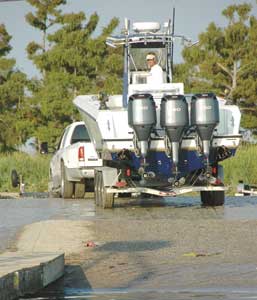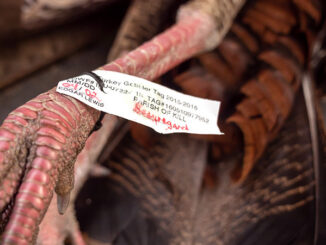
Franklinton resident Trey Riley fits into his surroundings even better than the game that frequently finds itself in his sights.
Those of us who tow our boats to and from the fishing grounds accept an elevated responsibility for ourselves and our trailered rigs when we share the road with fellow drivers. Those extra axles and the extended load make us less maneuverable, while at the same time making us a larger target for trouble from other drivers who may not be as skilled or attentive as they should be.
The last thing we need is to compound the threat by being distracted ourselves when we are behind the wheel.
The National Highway Transportation Safety Administration (NHTSA) estimates that nearly a third of the 3 million automobile accidents may be attributable to what is called “distracted driving.” Those distractions can — and do — include everything from eating and reading to shaving, watching television and surfing the internet while behind the wheel.
One of the most common culprits behind crashes among the distracted is the cell phone; several studies have shown it is simply not possible for most drivers to safely divide their attention between driving and talking on the telephone at the same time.
As trailer-boaters, discussions on cell phones are only one distraction that can avert our attention while we tow our boat down the road. The added responsibility for that trailer and its load requires us to refer to our rearview and side mirrors more often than drivers who are not towing a load. We need to make sure we are smart about when we take our eyes off the road and the vehicles ahead and reference our mirrors to make sure all is well behind us.
It’s also important to set those mirrors properly so that we can see our rig clearly and instantly without craning our necks, leaning to the side, rising in the seat or otherwise moving from a safe seating position. It goes without saying that those mirror adjustments need to be made before you leave the driveway.
Trying to wring every hour out of a weekend on the water may tempt us to perform some of the same multi-tasking we attempt to save time at work and home. Grabbing a bite to eat on the road while driving to the lake may save a half-hour, but that Big Mac in your lap puts you smack dab in the center of that distracted driver category and places a bullseye on you and your rig with every bite.
So does pulling out a road map. Make sure you know where you are going and exactly how to get there before you leave home. Worrying about the next turn, or fretting about whether you need to take the next, can cause you to lose concentration on the task ahead, and draw you into attempting some erratic driving. Not only that, but the only thing more distracting than reading a road map while driving is trying to fold one back up while behind the wheel.
GPS units make good traveling tools, are easier to reference than maps and many models can give you quick alternative routes if you do miss an exit or make a wrong turn. Some models even offer audible directions and alerts to upcoming turns. Just don’t be tempted to fiddle with your GPS while you are behind the wheel; pull over or have a companion do the routing for you.
Get your directions, your phone conversations and your meal down before you drive off with your boat in tow, or pull over and deal with each individually. Otherwise, you may end up learning the hard way that dividing your attention between driving and anything else can be as dangerous as it is distracting.


